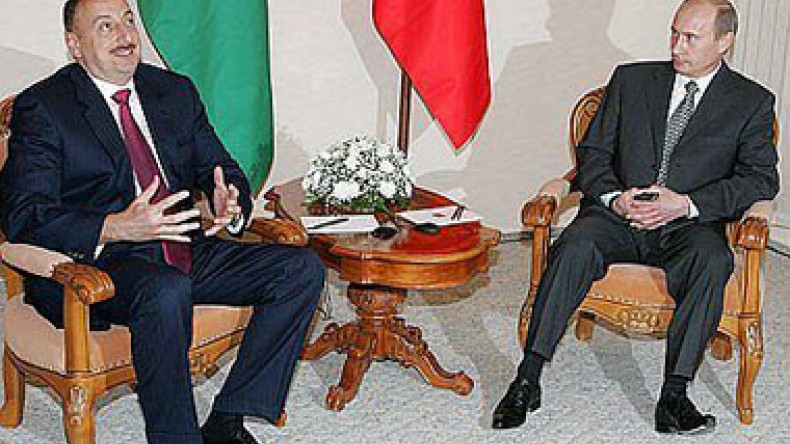
Quartz: Aliyev is modeling himself on Vladimir Putin
The renewed difficulties with Russia have once again highlighted the importance of cutting resource-dependency on such states. US and Europe have turned to Azerbaijan as an ideal diversifier to Russia. But it turns out there are plenty of reasons to be uneasy about this relationship. Political repression and antagonism toward neighbors make the nation seem like a miniature Russia, an article posted on outlet “Quartz” reads.
As the author notes, Azerbaijan’s aspirations for global prominence are abundantly clear. Yet, just a couple kilometers away from the glittering capital, things are not so glamorous. While a 1994 ceasefire between Armenia, NKR and Azerbaijan is technically still in place, skirmishes along the border with Azerbaijan are common, and tensions between the two nations have been steadily escalating of late. In July of 2014, border violence reached an all-time high since 1994, leaving eight Azerbaijani and two Armenian soldiers dead, according to Reuters.
In January, the mediating OSCE Minsk Group called for a bilateral de-escalation and ordered Azerbaijan to honor its commitments to a peaceful resolution of the conflict. Aliyev bit back, demanding that “measures must be taken” against Armenia — saber rattling that no doubt irritated the Russians, who maintain a mutual defense agreement with the Armenians.
According to the article, much of Azerbaijan’s ascendance can be attributed to its economy. However, with about half of the economy reliant on oil exports, the 50% fall in prices over the past seven months will inflict a significant drag on growth. The economy of Azerbaijan increased just 4% last year, and a similar figure is expected for 2015 which could provoke disquiet in a population defined by starkly contrasting levels of income inequality. But Aliyev has a number of tools at his disposal for effectively neutralizing criticism. First, there’s the State Oil Fund of the Republic of Azerbaijan (SOFAZ) that the government has been using to fill gaps in the budget.
“The second tool, which has been more frequently employed since Aliyev’s reelection in 2013, involves summary crackdowns on all signs of dissent. Azerbaijan’s growing middle class has become increasingly attuned to the behavior of elected leadership, particularly signs of corruption, and repression of political opposition. Aliyev’s response to criticism has involved arresting investigative journalists and civil-society activists, in addition to targeting NGOs that promote democracy,” the article reads, adding that Aliyev showed little regard for ensuing international criticism.
In recent weeks, there have been more calls from within the EU and US for sanctions against Aliyev and his regime. But the likelihood of any actual reprisals is remote. As the author notes, this is because condemnation from the US and Europe carries little weight in Baku. Azerbaijani leadership knows it has something Europeans need. Gas imports from Azerbaijan took on new significance in 2014 as Europe sought to dampen reliance on Russia. While Azerbaijani gas will probably meet only 2% of European demand over the next several years, a further deterioration in relations with the Kremlin could see a swift escalation in dependence on Azerbaijan’s resources. Moreover, the US will be reliant on Azerbaijan as a key transit point when it transports troops out of Afghanistan.
It’s pointed out in the article that Azerbaijan has been unafraid of rankling its more powerful neighbors—Russia and Iran. The country has angered Iran by allegedly allowing Israel access to bases near the Iranian border. Additionally, along with Kazakhstan and Turkmenistan, it has been in dispute with Russia and Iran for more than 20 years over maritime boundaries in the Caspian Sea. And when it came to a 2012 United Nations resolution condemning the actions of the Syrian President Bashar Assad, Azerbaijan sided with the US, thus going against Russia and Iran.
Among other methods to deflect negative attention have been “The New York Times” disclosures in 2012 about Azerbaijan hiring a Washington, DC-based lobbying firm with the purpose of expanding its relationships with US think-tanks. Former British Prime Minister Tony Blair has led a highly criticized public-relations campaign on behalf of the country.
Such audacity has so far been tacitly encouraged, the author writes, highlighting that during January 20 meeting with German chancellor Angela Merkel issues of human rights and Nagorno-Karabakh were treated with benign, almost sympathetic language, and the German leader instead focused on the practicalities of energy security.
“Azerbaijan’s ability to profit from a growing uncertainty of global order looks set to continue for now. However, relying disproportionately on the energy sector for economic growth, stifling the middle class, and behaving like an indiscriminate gadfly toward large powers are not viable strategies for long-term stability. It seems that Aliyev is modeling himself on Vladimir Putin, despite frequently butting heads with the Russian leader,” the author writes.
Newsfeed
Videos






























